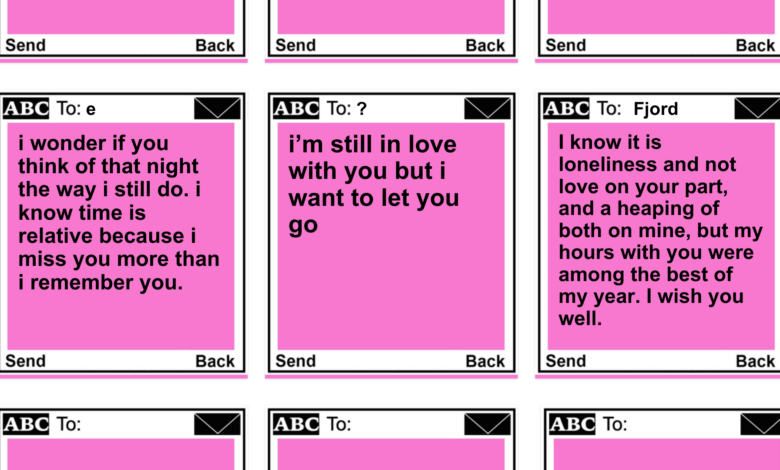Understanding The Unsent Project: A Journey into Unexpressed Emotions

Introduction to The Unsent Project
The Unsent Project is a unique initiative designed to provide individuals with a platform to articulate their feelings and emotions that may remain unexpressed in everyday life. Founded in response to the growing need for mental well-being and emotional expression, this project encourages participants to write letters addressing people they have deep feelings for, whether love, regret, or any other emotion. Often, societal norms or personal circumstances prevent individuals from sharing such sentiments directly. The Unsent Project aims to bridge this gap by allowing participants to express their thoughts without the pressure of actual delivery.
The inspiration behind The Unsent Project can be traced to the realization that many people carry the weight of unvoiced emotions in silence. This project offers an inclusive space for self-reflection, healing, and openness. By allowing individuals to write these letters anonymously, it creates an environment where vulnerability is welcomed, and readers can find solace in shared experiences. The project not only helps participants articulate their own feelings but also fosters a sense of community among those who engage with these unsent letters. It is a potential resource for personal growth, as well as a means of connecting with others who may have faced similar emotional dilemmas.
Within the framework of The Unsent Project, participants are encouraged to explore their thoughts and reflect on their relationships. This process can be incredibly liberating; it allows for introspection and emotional exploration without real-world ramifications. In essence, The Unsent Project serves as an emotional outlet for individuals, highlighting the importance of communicating sentiments often left unspoken and providing a valuable tool for processing complex emotions.
The Concept Behind The Unsent Project
The Unsent Project serves as a profound exploration into the realm of unexpressed emotions, encapsulating the experience of crafting messages that remain unsent. It highlights the inherent human tendency to harbor thoughts and feelings that often go uncommunicated, whether due to fear, vulnerability, or the complexities of the situations that surround them. At its core, The Unsent Project acts as a therapeutic platform, encouraging participants to articulate their sentiments without the pressure of delivering them, thus creating a reflective space for personal expression.
Psychologically, unsent messages can embody a crucial outlet for individuals grappling with unresolved emotions. They allow for introspection, giving a voice to feelings that might otherwise remain suppressed. Expressing sentiments through unsent messages grants individuals the freedom to confront their emotions, engage in self-reflection, and ultimately foster a deeper understanding of their internal experiences. The act of writing—even without the intent to send—can facilitate emotional processing, highlighting the significance of the unsent project in therapeutic contexts.
Furthermore, the unsent project speaks to the universal nature of human experiences. Participants are invited to share their stories, which fosters a sense of community and connection among individuals who may feel isolated in their emotional struggles. Through this collective sharing, The Unsent Project not only sheds light on personal experiences but also reinforces the idea that it is okay to hold feelings that are difficult to express. As individuals read the messages of others, they may encounter resonance with their own emotions, further validating their experiences and healing process.
In essence, The Unsent Project embodies a transformative journey into the depths of unexpressed emotions, promoting an environment of acceptance and understanding while encouraging individuals to embrace their complex emotional landscapes.
How The Unsent Project Works
The Unsent Project operates as a unique platform that encourages individuals to express their bottled-up emotions through unsent messages. The process begins with participants crafting messages that they have long withheld from sending. These messages can range from heartfelt apologies to unspoken thoughts about love and friendship. Submitting these messages is a straightforward process, requiring users to fill out a form that includes the text of their unsent message, alongside optional personal identifiers like their name or email address. However, anonymity is a core principle of the project—participants can choose to remain completely anonymous, which often encourages more honest and genuine submissions.
Once a message is submitted, it undergoes a brief review process to ensure it aligns with the project’s guidelines. The intentions behind these guidelines are to maintain a respectful and supportive community environment. If the message is accepted, it is then published on The Unsent Project’s platform, where it becomes part of a larger tapestry of human emotion. Participants can read other messages, fostering a sense of connection and understanding among individuals who may share similar experiences or sentiments. The project not only serves as a repository for these unsent messages but also creates an opportunity for reflection on unexpressed emotions, unfulfilled conversations, and the significance of communication in human relationships.
Importantly, the project provides a layer of safety and confidentiality for users. No personal information about the sender is revealed alongside their message unless they choose to disclose it themselves. This anonymity helps to cultivate a safe space where individuals are free to share their thoughts without fear of judgment or repercussion. As such, The Unsent Project not only assists in emotional release but also promotes collective healing through shared understanding, showcasing the power of words that have remained unspoken.
Real-life Impact of The Unsent Project
The Unsent Project has touched the lives of numerous individuals, providing a safe space for expressing emotions that often remain locked within. Through a collection of testimonials, it becomes clear how the act of sharing unsent messages transforms perspectives and fosters emotional healing. One participant, Sarah, shared that writing an unsent letter to her father helped her confront feelings of abandonment. By articulating her emotions on paper, she experienced a sense of relief, enabling her to move forward more positively in her life.
Similarly, James expressed how the Unsent Project encouraged him to communicate the unspoken words he held for a lost friend. He noted that while his letter was never intended to be sent, the mere act of writing it allowed him to acknowledge the depth of his grief. He remarked that this process offered him clarity and empowered him to honor the memory of his friend in a meaningful way.
Another participant, Priya, recounted her journey of self-discovery through the Unsent Project. After drafting a heartfelt message to her former partner, she realized that many feelings she had suppressed could no longer dictate her happiness. This acknowledgment of her emotions not only helped her gain closure but also fostered a deeper understanding of her worth and needs in future relationships.
The positive effects of the Unsent Project extend beyond individual experiences; communities have come together as a result, fostering connections through shared stories. Participants often convey that sharing their unsent messages publicly, within the framework of the project, has led to a greater sense of belonging. The act of revealing one’s innermost feelings, even without the intention of sending them, creates an empowering experience that promotes emotional resilience and healing.
Themes Explored in The Unsent Project
The Unsent Project serves as a profound lens through which to view the spectrum of human emotions that often remain unexpressed. Throughout its collection of unsent messages, several recurring themes emerge, including love, regret, forgiveness, and closure. These themes resonate deeply with individuals, reflecting the intricate nature of human relationships and the personal struggles that accompany them.
One of the most prominent themes is love, which manifests in many forms in the unsent messages. Individuals often grapple with the complexities of expressing affection, leading to sentiments of longing and admiration that are never fully articulated. This theme resonates because love is a universal experience; nearly everyone can relate to the overwhelming joys and heartaches that come with it, making it a vital aspect of the difficulty in communication.
Regret also emerges as a significant theme within The Unsent Project. Many contributors reflect upon missed opportunities or words left unspoken, leading to feelings of sorrow and introspection. This sentiment of regret often stems from the understanding that relationships can be fragile, and the hesitance to express oneself can result in lost connections, thereby amplifying the emotional weight of these unsent messages.
Forgiveness is further explored in the submitted writings, highlighting the ongoing battle individuals face in reconciling past conflicts and moving forward. The unsent messages reveal the complexity of seeking forgiveness, encompassing both the desire to forgive and the challenge of being forgiven. Lastly, the theme of closure resonates throughout many submissions, as individuals express their need to find peace with their past. The catharsis found in articulating these unresolved emotions emphasizes the critical role that closure plays in healing and personal growth.
Overall, these themes encapsulate the essence of The Unsent Project, offering valuable insights into the emotional struggles that characterize the human condition while fostering a deeper understanding of the complexities of interpersonal relationships.
The Unsent Project and Mental Health
The Unsent Project explores the intricate relationship between unexpressed emotions and mental health, providing a platform for individuals to articulate feelings that often remain unvoiced. This initiative emphasizes the significance of expressing these emotions, revealing the therapeutic potential of transforming unsaid words into written form. Through this process, individuals can experience emotional relief and clarity, facilitating a healthier mental state.
Research indicates that unexpressed feelings can lead to increased levels of anxiety, depression, and stress. The Unsent Project offers a constructive outlet for individuals to confront their feelings without the pressure of direct confrontation. It allows writers to engage in self-reflection, uncovering patterns and insights about their emotional experiences. By putting pen to paper, participants not only validate their emotions but also foster a sense of understanding and acceptance.
In therapeutic settings, similar practices are employed, where individuals are encouraged to articulate their thoughts and feelings. Techniques like expressive writing and journaling have been well-documented in psychological literature as effective methods for processing emotions. The Unsent Project aligns with these practices by promoting the idea that writing about unsent messages can yield significant mental health benefits. It serves as a reminder that one does not need direct communication to initiate emotional healing.
Additionally, sharing these unsent letters with a supportive community can create a sense of connection and belonging. Feeling heard, even indirectly, undoubtedly contributes to an improved sense of well-being. Consequently, The Unsent Project not only helps individuals to navigate their emotional landscape but also emphasizes the importance of community support in the journey towards mental wellness. Through this initiative, participants can embark on a transformative path, leading to greater emotional resilience and insight.
Community and Connection Through The Unsent Project
The Unsent Project serves as a unique platform that encourages individuals to share their unsent messages, thereby nurturing a sense of community and connection among participants. In an era where digital communication often overshadows authentic emotional expression, this project offers a space for people to articulate feelings that may remain unspoken. Each shared message resonates with others who have experienced similar emotional landscapes, creating a bond grounded in understanding and vulnerability.
As individuals contribute their unsent messages, they simultaneously bring forth their innermost thoughts and feelings. This act fosters connections among participants who have faced comparable emotional struggles, enabling them to recognize that they are not alone in their experiences. Through empathic engagement, individuals can find solace in knowing that there are others who resonate with their sentiments, further reinforcing communal ties.
The Unsent Project thrives on the principle that sharing one’s emotions—even in the form of unsent messages—can lighten the burden of isolation that often accompanies emotional distress. By opening up about unexpressed feelings, participants experience a profound sense of belonging, which is vital for emotional healing. These connections, formed in the context of shared unsaid messages, allow individuals to feel seen, heard, and understood, fostering a nurturing environment conducive to personal growth.
Furthermore, the community aspect of The Unsent Project transcends geographical boundaries, as people from various backgrounds come together through this common thread of emotional expression. Each participant contributes to a larger tapestry of feelings and experiences, illustrating the universal nature of struggles with communication and emotional expression. As more individuals share their unsent messages, the project continues to build a supportive community that champions the importance of emotional authenticity and connectivity.
Criticism and Controversies Surrounding The Unsent Project
The Unsent Project has garnered attention for its unique approach to emotional expression through anonymity. However, this methodology has sparked debates regarding its appropriateness and effectiveness. Critics often highlight concerns about the potential for harmful content and the implications of allowing individuals to express feelings without accountability. This anonymity can sometimes foster a space for negativity or inappropriate expressions, leading to questions about the platform’s overall impact on mental health.
Furthermore, some argue that while anonymity provides a safety net for expressing vulnerable emotions, it may also lead to a lack of genuine communication. Critics point out that the absence of accountability can distort the purpose of sharing one’s feelings, as the interactions become devoid of personal responsibility. The unsent project relies heavily on anonymous contributions, raising concerns about whether this method truly promotes healing or merely serves as an outlet for unfiltered thoughts that could be better addressed in a more constructive environment.
In conclusion, while The Unsent Project champions a novel approach to unexpressed emotions, it is essential to acknowledge the varied perspectives surrounding its implementation and impact. This ongoing dialogue fosters a critical examination of how anonymity in emotional expression can nourish or hinder personal growth and understanding.
The Future of The Unsent Project
The trajectory of The Unsent Project is poised for significant evolution, reflecting its commitment to understanding and articulating unexpressed emotions. As the platform gains traction, potential expansions may include new features that further facilitate emotional expression and exploration. One of the proposed additions is a mobile application that allows users to easily document their unsent messages on-the-go. This feature could enhance accessibility and encourage more people to engage with the project, ensuring that emotions captured are both spontaneous and genuine.
Furthermore, The Unsent Project could benefit from collaborations with mental health organizations and professionals. These partnerships would not only lend credibility but could also enhance the project’s mission to provide a safe space for emotional expression. Workshops or webinars designed in collaboration with these entities could offer users valuable resources for understanding their feelings and the importance of expressing them, ultimately broadening the project’s impact.
Additionally, integrating community features such as forums or discussion boards would create a platform for users to share their unsent messages and discuss the emotional experiences behind them. These features could foster a sense of belonging and support among users, enriching the overall experience of The Unsent Project. Encouraging users to share their own unsent messages could not only stimulate conversations but also inspire new insights into handling unexpressed emotions and improving mental well-being.
As The Unsent Project continues to grow, it is essential for users and supporters to contribute their perspectives and experiences. By sharing personal insights or unsent messages, individuals can help shape the future of the project, ensuring that it remains relevant and impactful. The potential for growth and innovation within The Unsent Project is vast, and the inclusivity of user experiences will be paramount in navigating its future journey.
You May Also Read This Usaworldtoday.




